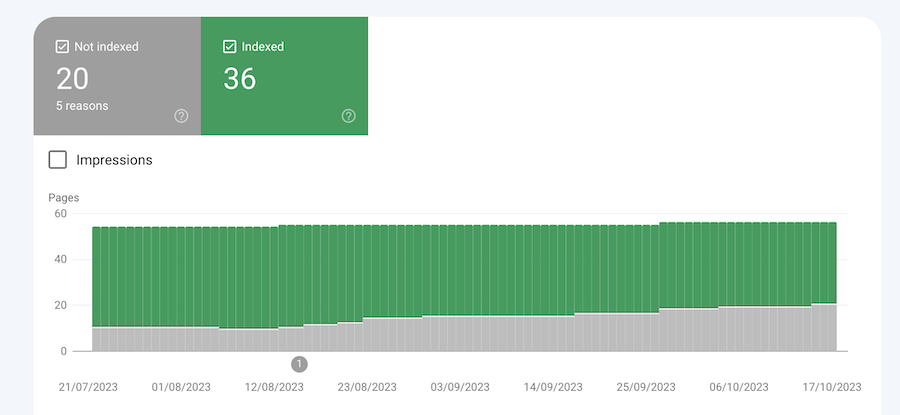How long does it take to index a page in Google Search Console? We’ve all been there. Google Search Console can be frustrating when our pages take forever to get indexed. So what is exactly normal and what isn’t?
One of the critical aspects that webmasters and we digital marketers often inquire about is the time it takes for Google to index a page or a full website.
In this article, I will delve into the timelines associated with Google indexing, the update duration for the Search Console, and the crawl time taken by Google bots.
For the purpose of this article I will mainly use a website that I run and is 6 months old and 56 pages (including category pages, etc) as an example.. I will also mention other website that I personally run and others from clients.
How Long Does It Take for Google to Index a Website?
The time it takes for Google to index a website can vary based on multiple factors. When a new webpage is created or an existing one is updated, Google’s crawlers need to first discover and analyse the changes to include the site in its index.
This process involves Googlebot, a web crawling bot, which scours the web, follows links, and analyses content.
When you create a new site, the website can get discovered and crawled very quickly, in a matter of days or a couple weeks top, as the case of this very site and another similar one that I launched at the same time.
However, the time it takes to index the actual pages of the site is longer. Even when you always get a few first pages indexed right after the crawl, others can take months.
For example, in this site that I am talking about, the crawling took place within a week since it went live. Now, 6 months in, one third of the pages are not indexed yet (36 are indexed and 20 aren’t).
In a similar website that I launched 3 months ago in a different niche, but same level of authority, SEO and number of posts, I have a similar scenario: still 40% of the pages have not been indexed yet. This website has a total of 59 pages, out of which 35 are indexed and 24 aren´t. I could have tried to get them indexed, but I didn’t have the time, and that is another story anyway.
As a third example, in a small ecommerce store launched in 2022 for a client and with mainly product pages (around 200 pages), the indexing was much quicker and 90% of the site was indexed in around 3 months.

Example of a site 6 months old with 59 pages, out of which 35 are indexed and 24 aren’t.
How Long Does It Take for Google to Index a Page?
The time it takes for Google to index a page can vary based on multiple factors, including:
- whether the website is brand new and hasn’t been discovered by Google,
- whether it’s new but already discovered, or
- whether it has older content.
Let’s explore each scenario:
1. How long it takes for Google to index a page when is website is new and has not been yet discovered and crawled
When a website is brand new and hasn’t been discovered by Google, the indexing process typically takes longer compared to established websites. Google’s bots need to find and crawl the website for the first time. This initial indexing process can take anywhere from a few days to a few weeks, depending on various factors such as the website’s size, content quality, and overall structure.
In the case of the website, I submitted the sitemap as soon as I had around 30 articles written. Some of them were indexed in a week and some of them took up to three weeks. Others were never indexed at all for some reason. Again, as of today, the site is 6 months old and has 59 pages, out of which 35 are indexed and 24 aren’t.
2. How long it takes for Google to Index a site when is new but has been already discovered and crawled
If a website is new but has already been discovered and crawled by Google, subsequent updates or additions to the website may be indexed relatively faster. Google’s bots are already aware of the website and its structure, making it easier for them to identify and index new or modified content.
For example, when this site was 3 months old (relatively “new”) and I added new posts after the initial 30, it took a week or less to naturally get them indexed. I am referring to those pages that got indexed. Others didn’t until this day.
In this scenario, new pages or updates to existing pages can be indexed within a few days to a week. And, from my experience, if nothing happens in that timeline, it is unlikely that it will happen in the future.
3. How long it takes for Google to Index a page in a site where most pages older than 2 weeks are indexed
For a website with content that is a few weeks old or older, Google’s bots generally aim to index new posts or updates within a shorter time frame. Since the website is already in Google’s index and has a history of being crawled, the bots may revisit the site more frequently to check for fresh content.
New posts or updates to older posts on an established website can be indexed within a matter of hours to a few days. Remember, my human friends, that Google values fresh and relevant content, and it strives to index such content promptly to ensure search results are up to date and accurate.
It’s important to note that these timelines are approximate and can vary based on multiple factors, including the website’s authority, content quality, server speed, and how frequently Google’s bots visit and crawl the website. Webmasters should focus on creating high-quality, relevant content and utilising tools like Google Search Console to monitor and optimise the indexing process.
How Long Does It Take for Search Console to Update a Site or a Page?
The time it takes for Google Search Console to update information for a site or a page can vary. Several factors influence the update frequency and timing, including the type of data and the website’s activity.
For example, the time it took for Google Search Console to update this website, purrfectmarketingstrategies.com after the domain changed from http to https was more than 1 month. After that a few pages were indexed in days, other in weeks and other, a few months after are not indexed yet.
The pages in the http property keep indexed unless you tell GSC that the canonical is https, by the way.
However, when I worked for a larger organisation with high authority, even when we didn’t put much effort into the SEO value of it, Google picked up new pages in a matter of days.
In another example of a niche site, with less authority but well established (7 years) and more content (around 300 pages), pages were updated daily in GSC and some of the best examples were in the first page of the SERP in less than a month.
In order to get pages indexed more quickly you can submit them for indexing individually. This does not guarantee that they will get indexed immediately, but it does help in some cases. Especially when you get just a few pages that for whatever reason have been ignored by Google for a while.
Here is my post on how to achieve faster indexing using Google Search Console.
How Long Does Google Crawl Take?
The crawl time by Google refers to the duration it takes for Google’s bots to traverse and analyse a website. Googlebot’s crawling speed can vary, and it’s important to note that Google does not disclose specific details about the time it takes to crawl a particular website.
Crawl Frequency: Googlebot continuously crawls the web, visiting some websites frequently and others less often based on their freshness, importance, and other factors.
Crawl Budget: Google allocates a “crawl budget” to each website, determining the number of pages and how often they are crawled. High-quality, frequently updated websites usually have a larger crawl budget.
Robots.txt and Meta Tags: The robots.txt file and meta tags like “noindex” or “nofollow” can influence Google’s crawling behaviour.
I hope that this article on how long it takes for Google Search Console to index helped give you an idea of what you can expect as an average.
As we´ve seen various factors affect the time it takes for Google to index both websites and individual pages. There are also different scenarios for new and established websites, domain changes, and the role of crawl time in the indexing process.
Stay whisker-tuned for my next purr-fect marketing update!
Moxie

